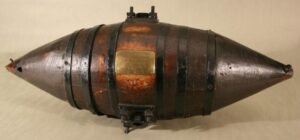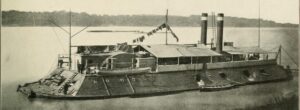That the Navy May Not Get Ahead

One of the joys of a historian is perusing obscure primary sources, finding wonderful first-person anecdotes that–like a strobe flash–illuminate people and conflicts of another era, and sharing them. St. Louis native Eliot Callender enlisted in the Union navy to serve on river gunboats. After the war, he became a noted historian and self-published a collection of speeches. Addressing a Chicago audience in October 1889 on the subject, “What A Boy Saw on the Mississippi,” he recounted the episode quoted in full below. A few paragraph breaks have been added for clarity.
By February 1862, Callender had risen to the rank of masters mate aboard the city-class ironclad USS Cincinnati, flagship of the Western Gunboat Flotilla commanded by Flag Officer (later Admiral) Andrew H. Foote. Cooperating with Brig. Gen. U. S. Grant and his Army of the Tennessee, the flotilla had captured Fort Henry on the Tennessee River (February 6) and was preparing to assault Fort Donelson on the Cumberland River.
An interesting incident (and one which has never seen print) occurred the evening before the battle: Generals Grant, McClernand, Smith and another officer whose name escapes me, came aboard the “Cincinnati” about dusk to hold a conference with the Admiral and arrange a program for the assault on the fort the next day. While they were in the cabin, the wooden gunboat “Conestoga,” under the command of Lieutenant (now Captain) Seffridge, which had been ordered on a reconnoitering expedition up the river to ascertain if the channel was clear of obstructions, dropped alongside of the flagship and unloaded a huge torpedo which she had pulled out of the river above, on the Cincinnati’s fantail.

The fantail of these ironclads was a space at the stern of the boat near the water edge, running the width of the boat and about fifteen feet deep; across it worked the steering apparatus connected with the rudders. From the extreme end of the fantail arose the iron end of the gun decks about ten feet high on an inclined plane, which was ascended by an ordinary ship ladder.
The conference being over, the army officers, accompanied by the Admiral, came down this ladder to the fantail, and were about embarking on the row-boat with which they had reached the flag ship, when their attention was attracted to the torpedo which lay at their feet. They gathered around it with expressions of interest and curiosity as it was the first seen in the war. It was a formidable affair, being an iron cylinder about five feet long and eighteen inches in diameter, pointed at both ends, with a long iron rod projecting upward, terminating at one end in three iron prongs to catch the bottom of the boat passing over it and connected at the other end with an ordinary musket lock which was fixed to explode a cap.
General Grant expressing a wish to see the mechanism of the affair, the ship armorer was sent for, who soon appeared with monkey wrench, hammer and chisels. The iron end was loosened and removed, disclosing another end in a cap with a screw head. It was now getting interesting and the assembled officers bent closely over it in order to get a better view of the infernal contrivance.
As this cap was unscrewed it allowed vent to a quantity of gas inside, probably generated from wet powder; it rushed out with a loud sizzing noise. Believing that the hour for evening prayer had arrived, two of the army officers threw themselves face down upon the deck. Admiral Foote, with the agility of a cat sprang up the ship’s ladder followed with commendable enthusiasm by General Grant.
Reaching the top, and realizing that the danger, if any, had passed, the Admiral turned to General Grant, who was displaying more energy than grace in his first efforts on a ship’s ladder, and said with his quiet smile, “General, why this haste?” “That the Navy may not get ahead of us,” as quietly responded the General as he turned around to come down. A hearty laugh was now in order and was indulged in by all hands. The armorer proceeded with his work and the dissection was completed. The thought has come to me more than once in these latter days, how the explosion of that torpedo that evening might have changed the entire history of the war.[1]
————
[1] Eliot Callender, Speeches of a Veteran (Chicago: Blue Sky Press, 1901), unpaginated, 22nd-23rd text page.
Excellent post. What I find most interesting is that this anecdote was also related by the bete noir of prissy historical purists, Shelby Foote. So I guess it can’t be true, or at best, somehow advances the Lost Cause.???
Great story! I wonder if the other officer, whose name was forgotten, was W. T. Sherman?
Good sea story.
Well, in this case, a river story but just as good. Thanks, Mark.